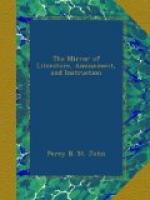[3] “Legis habet vigorem,
quicquid de consilio et consensu
magnatum
et reipublicae communi sponsione, authoritate regis,
juste
fuerit definitum.”—Bracton.
We recommend the reader to turn to the pages succeeding the above extract, where the views of the enlightened author and statesman on the origin of our parliament are set forth in perspicuous and masterly style.
* * * * *
VISIT TO CORFE CASTLE.
(From a Correspondent.)
This is Corfe Castle! the celebrated structure, the date of which, and the founder of which, are lost in antiquity:
“It
stands to tell
A melancholy tale, to give
An awful warning; soon
Oblivion will steal silently
The remnant of its fame.”
The castle is situate on the summit of a vast pyramidical mound, situated abruptly in an opening of the chalk range extending from Ballard Down to Worthbarrow in the Isle of Purbeck, county of Dorset. The walls are extremely thick, (12 feet in some places,) and are about half a mile in circuit. On the northern side the steepness of the ascent renders it inaccessible, and on the south is a deep ditch, over which is a bridge of three arches commanded by a gateway, flanked by two circular massive towers. The first ward has several towers. Passing onwards in a considerable ascent, we reached a second bridge guarded by a gate and towers, and entered the second ward, in which are the ruins of five towers. Winding round to the right, the explorer enters on the third and principal ward, which stands on the summit of the hill; here were the state apartments, store rooms, chapel, &c. built on vaults. The view from this portion of the ruin is magnificent. A wide expanse of flat country extending to Lytchett Bay and Poole, lies immediately at your feet. The gloomy fir trees wave in solemnity, and form in their darkness, a striking contrast with the dwellings that are scattered over the scene, and appear like specks of dazzling white; the estuary of Poole Harbour stretches along the distance like a mirror, and its molten silver-like appearance is broken here and there by small islands, among which Brownsea is conspicuous. Here we stood leaning over the northern battlement contemplating the face of a delightful country, smiling in peace,—from the stern and rugged fastness of war.
It was a bright summer’s day; strong masses of light and shade lay sleeping on the walls of the ruins, the dungeons were partially lighted by the rays which broke into their gloom, and it chanced to be a village holiday:
“Within the massy prison’s
mouldering courts,
Fearless and free the ruddy children played,
Weaving gay chaplets for their innocent
brows
With the green ivy and the red wall-flower,
That mocks the dungeon’s unavailing
gloom;




